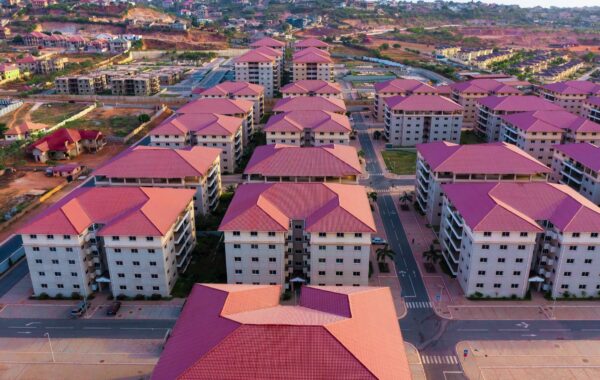
Why Renting Can Be a Smart Long-Term Strategy in Ghana
In Ghana, the traditional notion of homeownership has long been ingrained as the ultimate goal for many individuals and families. The idea of owning a piece of property holds immense cultural significance and is often viewed as a symbol of stability and success. However, in an ever-changing economic landscape, renting has emerged as a viable and increasingly attractive option, particularly in urban centres like Accra.
As the cost of living continues to rise and job security becomes more precarious, the flexibility and financial prudence offered by renting can provide a compelling alternative to the long-term commitment of homeownership. In this article, we will explore the reasons why renting can be a smart long-term strategy in Ghana, examining the financial, lifestyle, and practical considerations that make it an appealing choice for a growing segment of the population.
The Financial Advantages of Renting
Avoiding the Burden of a Mortgage
One of the most significant advantages of renting is the avoidance of a mortgage. Homeownership in Ghana often requires a substantial down payment and a long-term financial commitment in the form of monthly mortgage payments. This can be a considerable burden, especially for young professionals or families with fluctuating incomes.
By renting, individuals can sidestep the financial stress associated with a mortgage and enjoy greater flexibility in managing their monthly expenses. This freedom can be particularly valuable in an uncertain economic climate, where job security and income levels may be subject to change.
Lower Upfront Costs
Purchasing a home in Ghana typically involves a range of upfront costs beyond the down payment, including legal fees, stamp duties, and other associated expenses. These costs can add up quickly, making homeownership an expensive proposition, especially for first-time buyers.
Renting, on the other hand, generally requires a more manageable upfront investment in the form of a security deposit and, in some cases, the first month’s rent. This lower barrier to entry can make renting more accessible and less financially burdensome, particularly for those with limited savings or income.
Maintenance and Repair Costs Covered
As a renter, you are typically not responsible for the maintenance and repair costs associated with the property. These expenses are typically borne by the landlord or property management company, freeing you from the financial burden and hassle of managing repairs and upkeep.
In contrast, homeowners must factor in the costs of maintaining their property, which can be substantial and unpredictable. From roof replacements to appliance breakdowns, these expenses can strain household budgets and add an additional layer of financial stress.
Lifestyle Flexibility and Mobility
Ability to Relocate Easily
In today’s rapidly evolving job market and global economy, career opportunities may require individuals to relocate frequently. Renting offers the flexibility to adapt to these changing circumstances without the constraints and complications of owning a property.
If a new job opportunity arises in a different city or country, renters can simply terminate their lease and move without the hassle of selling a property or being tied to a specific location. This mobility can be invaluable for those seeking career advancement or exploring new opportunities.
Tailoring Living Spaces to Evolving Needs
As life circumstances change, such as starting a family or downsizing after children move out, renting allows individuals to easily adjust their living spaces to accommodate their evolving needs. Renters can seamlessly transition to larger or smaller units without the financial and logistical burdens associated with buying and selling properties.
This flexibility can be particularly appealing for young professionals, families, or empty nesters who may have varying housing requirements at different stages of their lives.
Access to Amenities and Prime Locations
Many modern rental properties in Ghana offer a range of amenities and conveniences that can enhance the overall living experience. From well-maintained communal spaces and recreational facilities to on-site security and property management services, renters can enjoy a lifestyle that may be challenging or costly to replicate in individually owned homes.
Additionally, rental properties are often strategically located in prime areas with easy access to transportation, shopping, and entertainment, allowing residents to take advantage of the vibrant urban lifestyle without the commitment of homeownership.
Practical Considerations for Long-Term Renting
Building a Solid Rental History
While renting may not contribute to building equity in a property, it can help establish a strong rental history. This documented record of responsible tenancy can be valuable when seeking future rental opportunities or even when applying for loans or mortgages down the line.
By consistently paying rent on time and maintaining the rental property in good condition, renters can demonstrate their reliability and financial responsibility, which can improve their prospects for securing desirable rental properties or obtaining favourable terms if they eventually decide to pursue homeownership.
Potential for Rent Control or Stabilization
In certain areas of Ghana, particularly in major cities like Accra, rent control or stabilization measures may be in place. These regulations can provide long-term renters with a degree of protection against excessive rent increases, ensuring a level of affordability and predictability in their housing costs.
While these measures may vary by location and are subject to changes in legislation, they can offer a measure of security for those who plan to rent for an extended period, mitigating the potential financial strain of rapidly rising housing costs.
Tax Advantages for Renters
In Ghana, renters may be eligible for certain tax benefits or deductions related to their rental expenses.
It’s essential to consult with a qualified tax professional or refer to the relevant tax regulations to understand the specific deductions and requirements that may apply to your individual situation.
Navigating the Rental Market in Ghana
Understanding Rental Agreements and Tenant Rights
When renting in Ghana, it is crucial to familiarise yourself with the standard rental agreements and tenant rights in your area. These legal frameworks aim to protect both landlords and tenants, ensuring fair and transparent rental practices.
Understanding your rights and obligations as a tenant, you can make informed decisions and advocate for yourself if any disputes or issues arise during the rental period. Additionally, being aware of local regulations can help you navigate the rental market more effectively and avoid potential pitfalls.
Leveraging Online Resources and Professional Services
In today’s digital age, numerous online resources and professional services are available to assist renters in their search for suitable properties. Popular real estate platforms and rental listing websites can provide a wealth of information, enabling renters to explore options, compare prices, and research neighbourhoods conveniently.
Additionally, working with reputable real estate agents or property management companies can streamline the rental process and provide valuable insights into the local market conditions, negotiation tactics, and potential areas of concern.
Building a Supportive Rental Community
Renting can foster a sense of community and camaraderie among residents who share similar living experiences. Many rental properties in Ghana have active resident associations or social groups that organize events, address shared concerns, and create a supportive environment for tenants.
Engaging with these communities can not only enhance your overall living experience but also provide a platform for networking, sharing resources, and advocating for tenant rights or improvements within the rental property.
Conclusion
While homeownership remains a cherished aspiration for many Ghanaians, the benefits of renting should not be overlooked. In an era of economic uncertainty and rapidly evolving lifestyles, renting can offer financial prudence, flexibility, and practical advantages that align with the needs of modern urban living.
Embracing renting as a long-term strategy, individuals can enjoy a higher degree of mobility, access to amenities and prime locations, and the ability to adapt their living spaces to changing circumstances. Furthermore, the potential for rent control or stabilization measures, tax benefits, and the opportunity to build a solid rental history add to the appeal of renting for an extended period.
As the real estate landscape in Ghana continues to evolve, it is essential to consider all options and make informed decisions that align with your personal goals, financial situation, and lifestyle preferences. Renting can be a smart and viable choice for those seeking a balanced approach to housing, offering the freedom to focus on other life priorities without the constraints of homeownership.
If you’re considering renting as a long-term strategy in Ghana, Eden Heights offers a luxurious and amenity-rich living experience in the heart of West Accra. With spacious apartments, world-class facilities, and a serene environment, Eden Heights is the perfect choice for those seeking the ultimate in comfort and convenience. Contact us today to schedule a viewing and explore the possibilities of elevated urban living.
FAQs
1. Is renting a waste of money in Ghana?
Renting is not a waste of money in Ghana. While you may not be building equity in a property, renting provides numerous benefits that can make it a financially prudent choice. By avoiding the substantial upfront costs and long-term financial commitment of a mortgage, renters can enjoy greater flexibility in managing their monthly expenses. Additionally, renters are not responsible for maintenance and repair costs, which can be significant and unpredictable for homeowners. Renting also offers the freedom to easily relocate for career opportunities or lifestyle changes without the hassle of selling a property.
2. How can I find reliable landlords and rental properties in Ghana?
To find reliable landlords and rental properties in Ghana, it’s advisable to leverage online resources and professional services. Popular real estate platforms and rental listing websites can provide a wealth of information about available properties and landlords. Working with reputable real estate agents or property management companies can also be beneficial, as they have extensive knowledge of the local market and can guide you through the rental process. Additionally, seeking recommendations from friends, colleagues, or local community groups can help you identify trustworthy landlords and well-maintained rental properties.
3. Are there any rent control or stabilization measures in place in Ghana?
In certain areas of Ghana, particularly in major cities like Accra, rent control or stabilization measures may be in place. These regulations aim to provide long-term renters with protection against excessive rent increases, ensuring a level of affordability and predictability in their housing costs. However, the specific regulations and their implementation can vary by location and may be subject to changes in legislation. It’s essential to research the local rental laws and regulations in the area where you plan to rent to understand the potential benefits and limitations of these measures.
4. What should I look for in a rental agreement in Ghana?
When reviewing a rental agreement in Ghana, it’s crucial to pay attention to several key elements. Carefully read and understand the terms and conditions, including the rental period, rent amount, security deposit requirements, and any clauses related to rent increases or renewals. Additionally, ensure that the agreement outlines the responsibilities of both the landlord and the tenant regarding maintenance, repairs, and utilities. It’s also advisable to familiarize yourself with your rights as a tenant under local laws and regulations. If you have any questions or concerns, don’t hesitate to seek clarification or legal advice before signing the agreement.
5. Can renters in Ghana claim any tax benefits or deductions?
In Ghana, renters may be eligible for certain tax benefits or deductions related to their rental expenses. For example, individuals who rent accommodations for business or employment purposes may be able to claim a portion of their rent as a deductible expense on their tax returns. However, the specific deductions and requirements can vary based on individual circumstances and tax regulations. It’s advisable to consult with a qualified tax professional or refer to the relevant tax authorities to understand the potential tax benefits and the documentation required to claim them.


